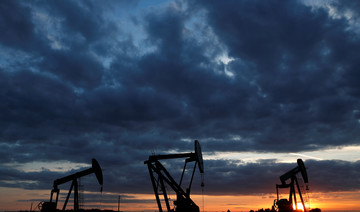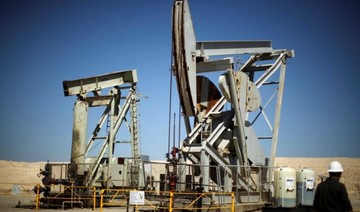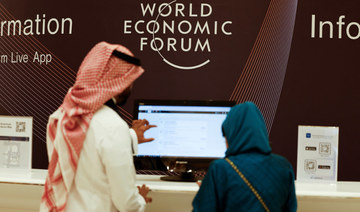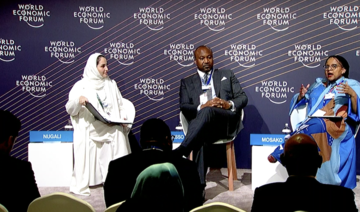What David Hodson does not know about the oil and gas business — and the multi-trillion-dollar financial infrastructure behind it — is probably not worth knowing.
The 64-year-old oil veteran has more than four decades’ experience in the sector, and now runs energy finance consultancy BluePearl Management in Dubai, offering advice to energy companies, project managers and banks, especially those working in what he calls the “tough neighborhoods” of the world — energy frontier markets such as Africa, Pakistan and Afghanistan.
With the global energy industry facing enormous change — prompted by the emergence of the US as a leading oil exporter, the potential widening of the Organization of Petroleum Exporting Countries (OPEC), and the rise of renewable energy — his expertise and experience are in demand.
“We all look forward to the brave new world of renewable energy, and also need to push for cleaner use of the hydrocarbons we know. But in the meantime, oil and gas make the world go round, and after a tough period, I definitely see a recovery now,” he told Arab News.
“The global product demand growth for oil and gas is being seen across India and Africa as these economies become much more energy intensive. On the production side, big projects are being developed in the gas and LNG production sector in East Africa,” he said.
Hodson explained the issues confronting the energy industry in the 21st century, and the challenges facing Middle East energy companies as they adapt to the “brave new world.” One factor, he believes, has transformed the oil world, and raised questions for traditional producers and exporters.
“The era of OPEC global dominance all changed in late 2015 when US crude export restrictions were removed. While it has taken some time for the global impact to be felt from US production, I believe OPEC’s strength has been forever reduced, and it is not in pole position anymore, especially as additional future non-OPEC production is likely to develop in places like Mexico, Africa, and Latin America,” he said.
“OPEC production quotas are likely to encounter problems in holding firm, especially among some members, as the oil price continues to rise. Hungry producers are looking to top up their cash and rescue ailing budgets. But the recent Russian cooperation with OPEC has really been an unprecedented lifeline for the producers when the market was oversupplied,” he said.
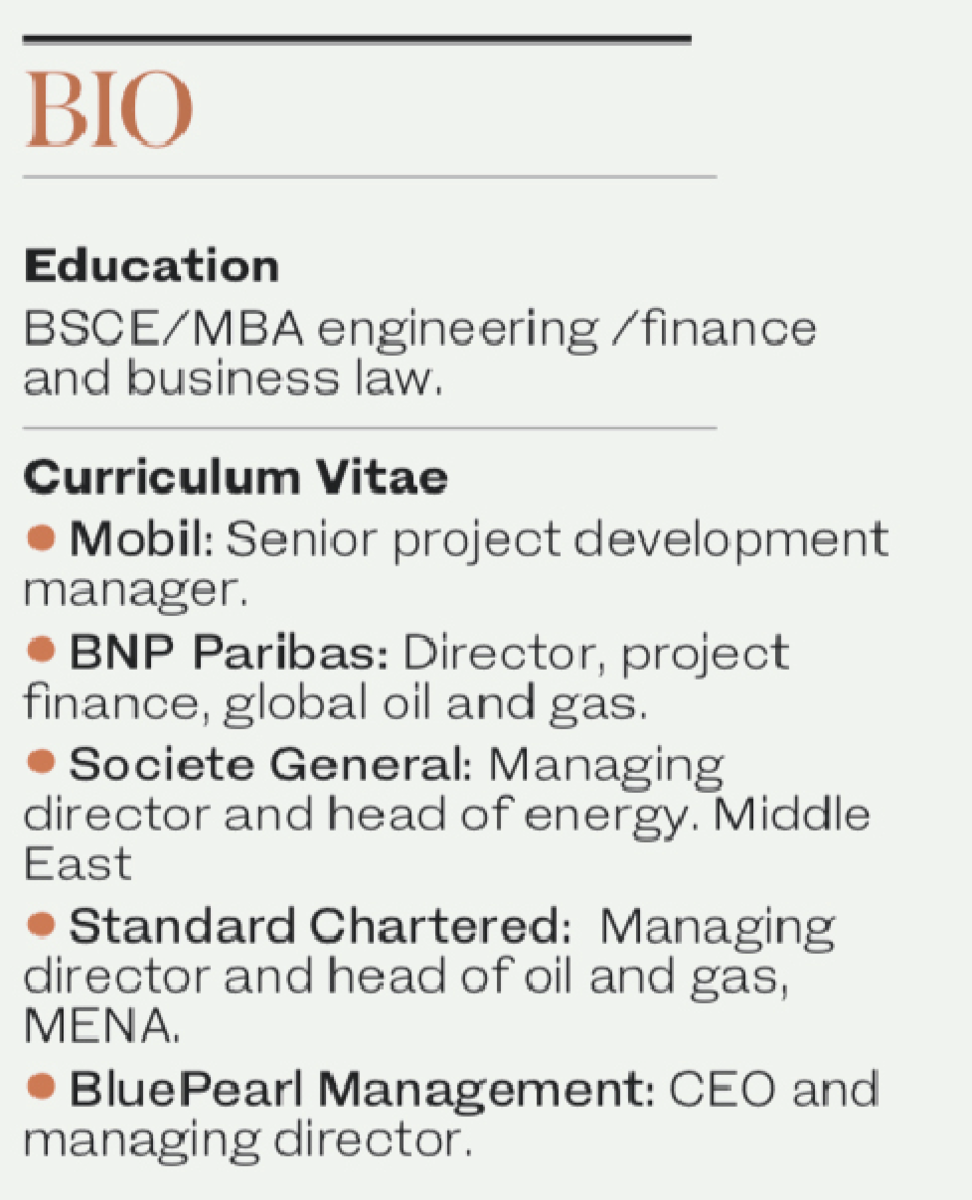 As an American, born in New Jersey, Hodson takes satisfaction from the rise of US oil to its present position. The country is now the second-largest producer in the world, having overtaken Saudi Arabia several months ago, and is set to leapfrog Russia to assume the number-one spot later this year.
As an American, born in New Jersey, Hodson takes satisfaction from the rise of US oil to its present position. The country is now the second-largest producer in the world, having overtaken Saudi Arabia several months ago, and is set to leapfrog Russia to assume the number-one spot later this year.
Hodson came into the business via civil engineering, working with Mobil in the 1970s, before it merged with Exxon to become the biggest independent oil producer in the world. The coming together of the two companies in 1998 — by which time Hodson had left for pastures new — was as much a merger of cultures as of corporations.
“Mobil was always the more creative side of the industry, more global in its outlook compared with Exxon. My job was to build refineries, gas plants, pipelines — big projects, and the job gave me global experience, in Hong Kong, Tokyo, and Saudi Arabia,” he said.
Such billion-dollar projects take years to complete, involving a multitude of parties in planning, construction and finance, with the financing of the industry just as important as the on-the-ground business of drilling, refining and transporting. Hodson entered this world in 1994, swapping his hard hat for a business suit, when French financial institution Banque Paribas (which later merged with domestic rival BNP) came calling.
“The French wanted somebody for project finance, big structural projects, and I headed off to Paris. I was in Paribas HQ and got to know all the senior people there, just as the French were expanding in the oil and gas business in the Middle East.”
His focus at Paribas subsequently shifted across the Atlantic. At the time the energy business in Latin America was beginning to take off as new technologies allowed explorers to get to reserves that had hitherto been inaccessible. Swapping Paris for New York, he gained a different view of the global energy business.
“Venezuela was steaming with opportunities. The Venezuelans were waking up to the downstream potential of their enormous energy resources,” he said.
Hodson worked on Cerro Negro in the Orinoco fields, then one of the biggest-ever projects to convert extra-heavy crude to lighter, more marketable downstream products.
That trend toward the downstream has continued, and much of the attention in the global oil business is now on the value-adding potential beyond exploration and production.
This is particularly the case for Gulf producers. Saudi Aramco has put heavy emphasis on this area, which it sees as a way of adding value to its overall business, moving beyond a simple “pump and pipe” model. The Abu Dhabi National Oil Company (ADNOC), the UAE state-owned producer, is also concentrating on the downstream operations, and has promised multibillion-dollar investment and partnerships in the area. A top-level conference in the UAE’s capital in the coming week — the Abu Dhabi Downstream Investment Forum — is likely to provide further detail on this strategic shift.
“The awakening of ADNOC Downstream is very big and positive news for the UAE and the region. I believe that ADNOC will achieve their ambitious downstream-oriented goals with the involvement of well-organized joint venture partners. They are certain to become a real global oil, gas and petrochemical powerhouse and will realize much more profit from the overall value chain,” Hodson said.
His Paribas experience taught him enough to launch out on his own, and in the early 2000s he became an independent consultant based in Houston. But, as if to illustrate the vulnerability of the energy industry to unforeseeable external events, Hurricane Katrina in 2005 devastated the biggest energy centers of the world’s biggest economy. “Many of my clients were wiped out,” he said.
The French connection saw him through a difficult time. Societe Generale, another Paris-based financial institution, wanted to build an oil and gas business in the Middle East, and Hodson was made the Dubai-based managing director of the bank’s MENA business.
Another hurricane, this time a financial one, was about to rip through the energy business, with the global financial crisis of 2008. SocGen, as the French bank is informally known, had already experienced its own crisis with the revelation of heavy losses built up by “rogue trader” Jerome Kerviel,
and decided to pull in its horns across the world, including in the Middle East.
Once again, Hodson set out on his own, launching BluePearl in 2009, just as the dust was settling on the crisis. After being affected by the economic recession that followed the financial crisis, oil prices had began to recover quickly.
A short stint from 2011-13 at Standard Chartered, which was looking to bolster its investment banking business in energy, only served to reinforce the conviction that he was better equipped to go it alone.
He had relationships at a senior level with Saudi Aramco since the Paribas days in the early 1990s, and developed those further as the Saudi national oil company headed into the most turbulent and transformational time in its 80-year history: The era sparked by the 2014 collapse in the oil price and the launch of Saudi Arabia’s Vision 2030 economic transformation program, for which the planned initial public offering of Aramco is the keystone.
Hodson chose his words carefully on these issues. On the oil price, he said: “After three or more years of very limited capital expenditure into new global oil production, crude oil prices will rise and even spike until a new balance settles in to accommodate healthy global demand growth. Finding that new market balance will likely create volatility throughout this year into early 2019.
“There are so many variables. Oil production in Venezuela has plummeted due to incompetent government and Angola production has decreased significantly. The big question looming is on the Iran nuclear deal, with a decision expected by President Trump soon. New US sanctions would put even more pressure
into the market.”
On the Aramco IPO, he was equally cautious, but his thinking seems to be in line with the mood at Aramco’s Dhahran headquarters. “The mechanics of making it all work lie in how and when it is launched. I wonder if a ‘stepped approach’ wouldn’t be most practical — maybe first listing on the Saudi market, followed by an international venue launch after getting through a post-IPO settling-in period.
“But you have to ask: what is the rush for the global IPO listing? Unlike bond issues and syndicated loans, you only get to do an IPO once, so you need to get it right.”
Veteran oil man David Hodson on OPEC’s future after ‘tough period’ for energy market
Veteran oil man David Hodson on OPEC’s future after ‘tough period’ for energy market
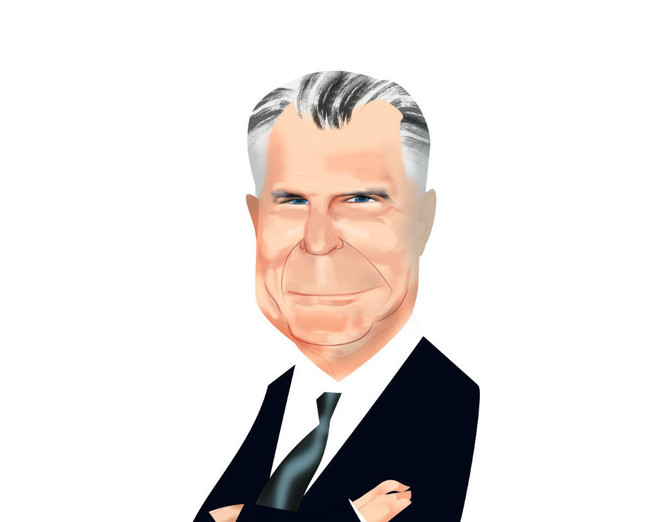
Dubai ruler approves new $35bn airport terminal
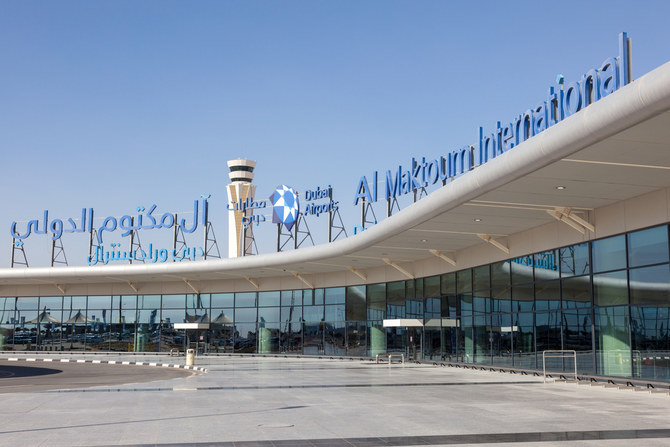
CAIRO: Dubai’s ruler Sheikh Mohammed bin Rashid Al-Maktoum approved a new passenger terminal in Al Maktoum International airport worth 128 billion dirhams ($34.85 billion), he said on Sunday in a post on X.
The Al Maktoum International Airport will be the largest in the world with a capacity of up to 260 million passengers, and five times the size of Dubai International Airport, he added, saying that all operations at Dubai airport would be transferred to Al Maktoum in the coming years.
The Al Maktoum airport will also include 400 terminal gates and five runways, he said.
The airport will be the new home of flagship carrier Emirates and its sister low-cost airline Flydubai along with all airline partners connecting the world to and from Dubai, Dubai state-owned airline Emirates chairman Sheikh Ahmed bin Saeed Al-Maktoum said.
The move “further solidifies Dubai’s position as a leading aviation hub on the world stage,” the CEO of Dubai Airports, Paul Griffiths, was quoted as saying by the Dubai Media Office.
Oil Updates – prices fall 1% on Israel-Hamas ceasefire talks, US inflation concerns
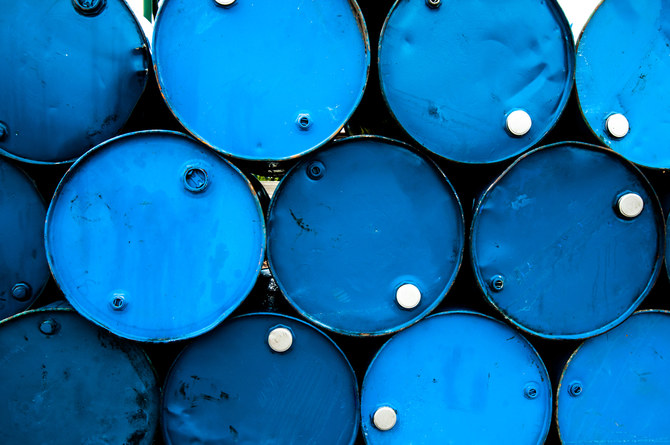
BEIJING/NEW DELHI: Oil prices were down 1 percent on Monday, erasing gains from Friday as Israel-Hamas peace talks in Cairo eased fears of a wider conflict in the Middle East and US inflation data further dimmed the prospects of interest rate cuts anytime soon, according to Reuters.
Brent crude futures fell by as much as 98 cents, or 1.09 percent, to $88.52 a barrel by 9:44 a.m. Saudi time. West Texas Intermediate futures were down 83 cents, or 0.99 percent, at $83.02 a barrel.
Stepped-up efforts to mediate a ceasefire between Israel and Hamas moderated geopolitical tensions and contributed to the weak opening on Monday, IG market analyst Tony Sycamore said. A Hamas delegation will visit Cairo on Monday for peace talks, a Hamas official told Reuters.
Israel’s foreign minister said on Saturday a planned incursion into Rafah, where more than one million displaced Palestinians are sheltering, could be put off in the event of a deal that involves the release of Israeli hostages.
A White House spokesperson said Israel had agreed to listen to US concerns about the humanitarian effects of the potential invasion.
Markets are also on watch for the US Federal Reserve’s May 1 policy review.
“Also playing a part are some nerves ahead of this week’s Federal Open Market Committee meeting which is expected to come with a more hawkish tone,” Sycamore said.
US inflation rose 2.7 percent in the 12 months through March, data on Friday showed, above the Fed’s target of 2 percent. Lower inflation would have increased the likelihood of interest rate cuts, which would stimulate economic growth and oil demand.
“The sticky US inflation sparks concerns for ‘higher-for-longer’ interest rates,” leading to a stronger US dollar and putting pressure on commodity prices, independent market analyst Tina Teng said.
The dollar strengthened on the prospect of higher-for-longer interest rates. A stronger dollar makes oil more expensive for those holding other currencies.
Further weighing on the outlook for oil demand, China’s industrial profit growth slowed down in March, official data showed on Saturday, in the latest sign of frail domestic demand in the world’s second largest economy.
Cumulative profits of China’s industrial firms rose 4.3 percent to 1.5 trillion yuan ($207 billion) in the first quarter from a year earlier, compared to a 10.2 percent rise in the first two months.
But oil prices could swing higher again if US inventory data and China’s PMI index show improvements this week, Teng said.
Brent had settled up 49 cents and WTI up 28 cents on Friday on concerns about disruptions to supply from events in the Middle East.
The market brushed aside potential supply disruptions stemming from Ukranian drone strikes on the Ilsky and Slavyansk oil refineries in Russia’s Krasnodar region over the weekend. The Slavyansk refinery had to suspend some operations after the attack, a plant executive said.
Algeria asked by Europe to boost gas supply
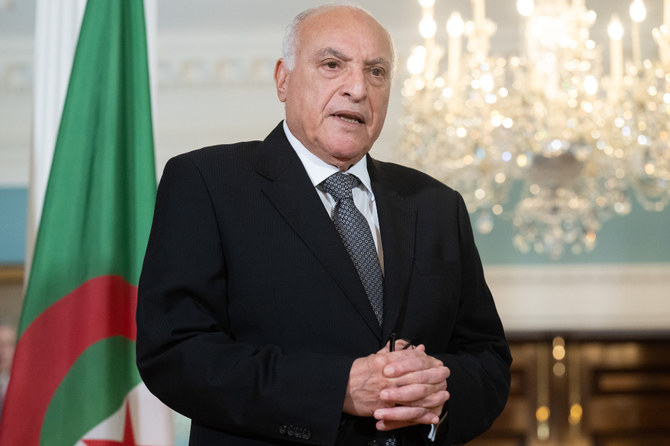
- Regional, global conflict affecting energy industry, says Algeria FM
- Key constraints are Israel war on Palestine, Ukraine-Russia battle
RIYADH: Algeria has been asked by its partners in Europe to increase gas supply because regional and global conflicts have affected the industry, the country’s foreign minister said on Sunday.
Speaking at a special World Economic Forum meeting in Riyadh, Ahmed Attaf said his country has established a “very complex network of cooperation” with its partners in the region.
“We are a Mediterranean country. We are a gas-producing country. We are asked by our partners in Europe more and more to deliver additional quantities of gas,” he said.
Speaking about how the global environment has changed over the past two-and-a-half years, Attaf said that conflict has affected the energy market, which requires more effective intervention from the UN and its Security Council.
“We have, of course, the conflict in Ukraine that is impacting our region. We have the Palestinian-Israeli conflict that is also impacting our region, and we have the Sahel region. And we are also feeling the impact of the deteriorating situation in this region on the Euro-Mediterranean area,” he added.
He said the “sophisticated” energy cooperation did not come at “the cost of our commitments to alleviating the effects on our environment.”
Saudi Arabia committed to preserving environment, water resources, minister tells WEF
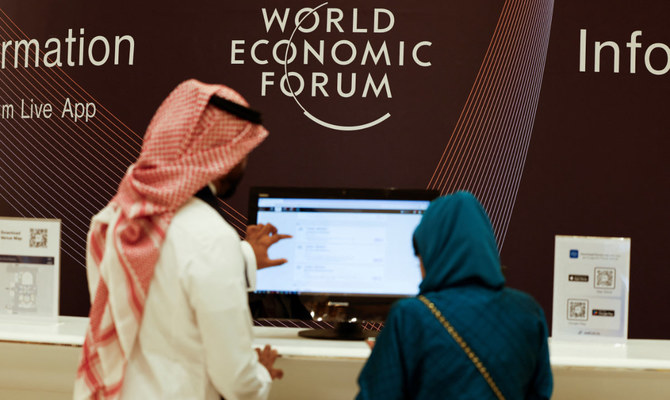
- Nation providing incentives for private sector to become more engaged, Abdulrahman Al-Fadley says
DUBAI: Saudi Arabia has detailed plans for the protection of its lands and environmental resources, the Minister of Environment, Water and Agriculture said on Sunday.
Speaking at the World Economic Forum in Riyadh, Abdulrahman Al-Fadley said: “We have devised our plans based on the preservation of our environment and the management of our water resources. The Kingdom is also providing incentives for the private sector to become more engaged and more responsible toward the environment.”
With 40 percent of lands around the world degraded and further degrading at an alarming rate, critical action is needed as the UN Convention to Combat Desertification COP16 is set to take place in Riyadh in December.
Al-Fadley said Saudi Arabia had preserved millions of hectares of land and set up programs for cloud seeding and increasing the number of dams in the country.
“This will not only be beneficial to the Kingdom but for the whole region,” he said. “With us hosting COP16 we are hoping to give the meeting the importance it commands. We don’t want matters to go back to the status quo after COP16 ends.”
Tariq Al-Olaimy, a member of the Global Shapers Community Foundation Board at the WEF, commended King Salman for his land restoration efforts.
“When you put nature first, you are equally putting people first,” he said. “Nature is our greatest collaborator … There is no successful growth story without successful land restoration and this starts inwardly, through our religion, community, values and moral clarity.”
Ibrahim Thiaw, secretary of the UNCCD, warned of global repercussions if the world did not pay heed to environmental safekeeping.
“Entire ecosystems are being destroyed through actions and inactions,” he said. “There has been a 29 percent increase in droughts in the past few years and that is affecting 1.8 billion people around the world. For poor nations that is disastrous and carries a large death toll of animals, people and agriculture. We have to be more proactive and not just emergency-ready. We must attempt to avoid emergencies.”
Thiaw said the Panama Canal’s functionality had been reduced by 12 percent, which was causing a problem for supplies.
“Demand is increasing while resources are shrinking,” he said. “As humanity we have been looking at resources as if they are unlimited. We have not been managing them. Companies need to reset their relationship with nature and we need to focus on land restoration to keep going.”
Naoki Ishii, director of the Center for Global Commons, had similar concerns.
“We are on a collision course,” he said. “The only solution is to modify our economic system. COP16 must be transformative for all of us. We need the political momentum to implement positive changes.
“If we are able to push those efforts, economically and ideally speaking, that will be a game changer.”
Saudi Arabia, UAE have world’s most ambitious decarbonization programs: WEF panel
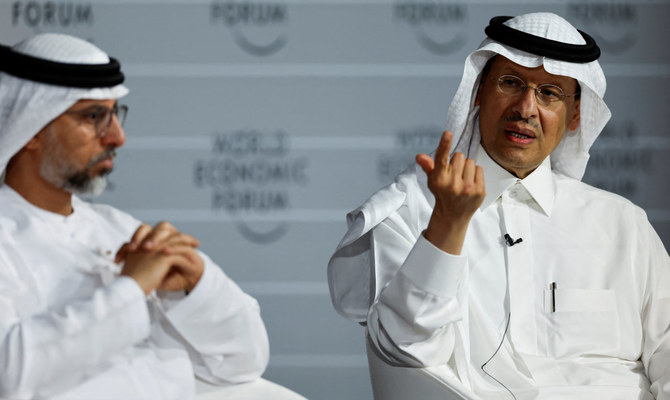
- “Solving sustainability problems requires technology and China has contributed greatly by increasing technical progress and making the cheapest energy available to the world”
DUBAI: A panel of ministers and experts gathered at the World Economic Forum in Riyadh on Sunday to discuss the road map for tripling renewables by 2030.
The UAE’s Minister of Energy and Infrastructure Suhail Mohamed Al-Mazrouei said his country’s goal would not only be reached but possibly exceeded by 2030.
“The UAE has been offering solar power to aid the world in reaching the goal of tripling renewables,” he said. “We have very few years until 2030, we need to work alongside and encourage countries to make the achievement by then.”
Li Zhenguo, president of Longi Green Energy Technology, said the Chinese government had been at the forefront of efforts to develop renewables.
“In 2023, China installed 216 solar power plants, which is more than 50 percent of the global capability,” he said.
“Solving sustainability problems requires technology and China has contributed greatly by increasing technical progress and making the cheapest energy available to the world.”
Marco Arcelli, CEO of Saudi-based ACWA Power, said he was surprised by the momentum in the region.
“Saudi and UAE have the most ambitious decarbs programs in the world. There is a speed and dimension you don’t see much elsewhere,” he said.
“There is leadership with a vision, there is cheap energy available and I believe you will start seeing greenshoring in the Kingdom by 2030. Lots of upcoming projects in the country, be it NEOM or others, will be solar driven and using renewable energy.”
Kuwait’s Minister of Electricity, Water and Renewable Energy Salem Alhajraf said there was a need to increase global production capacity.
“Innovative financing is key,” he said. “We need to move from small giga-sized projects to deploying renewables. Cities or towns with small populations can possibly have all their needs met by solar power.”
Stephanie Jamison, global Resources Industry Practices chair at Accenture, said her company had been developing guidelines for community engagement and nature transition.
“By conducting surveys and interviewing various CEOs, it has become clear that companies understand the impact they are making on nature. And so, partnerships between companies and proactive partnerships between companies and the community is one way to tackle challenges.”



